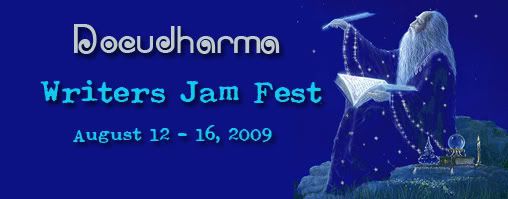Author's posts
Dec 30 2009
Sending love and wishes to Zelda Rubinstein, actress and activist
Most of you know who Zelda Rubinstein is, even if you don’t know her by name. The 4′ 3″ actress made a huge mark in popular culture when she starred as the mysterious Tangina Barrons in the Poltergeist series, delivering one of the film’s most memorable lines – “Step into the light, Carol Anne!” – and winning a Saturn Award for Best Supporting Actress to boot.
Many of us (myself included) might not realize that Rubinstein was also an activist, among the first celebrity faces of the safe sex campaign to stop the spread of HIV/AIDS – doing so all the way back in 1984, at great personal and professional risk.
Today radaronline is reporting that Rubinstein was taken off life support. I’d like to send best wishes to her and her family, along with warm thanks for all that she’s done.
Aug 15 2009
Writing under constraint: and why it rocks.

I’ve mentioned this in a few comments already, but I thought a broader discussion of the topic of constraint was worth having, and dovetails nicely with the Writers’ Jam Fest.
(If you want to skip to the fun stuff, move on to parts three and four of this essay, Examples and Assignments.)
1. What is a ‘constraint’?
Simply speaking, a constraint is a formal rule that you set for yourself at the outset of writing. Constraints can be broad (All my protagonists will have names beginning with ‘A’) or unproductively narrow (I’ll only use punctuation to tell my story), but they help set parameters for your work.
Now maybe you’re looking at that and thinking, “Meh, that’s too artificial. I prefer to write from inspiration.”
But there are other ways to look at it, too. Imagine I gave you the following assignment: “I want you to write a poem about whatever topic you want, but you have to limit it to exactly 14 lines. Oh, and every line has to be in iambic pentameter. Also, I want you to alternate rhymes for the first three sets of four lines, and you have to treat the remaining two lines like a rhyming couplet.”
Sounds stupidly artificial?, but that’s your recipe for a Shakespearean sonnet.
It may seem counterproductive, but the paradox of constraints is that they actually foster creativity rather than limit it. By having to meet a predetermined set of rules, you’ll find that you explore paths you normally wouldn’t.
Jun 28 2009
More good news on the LGBT front: HIV travel ban to be lifted soon
Last week I posted a diary about LGBT legislation before Congress, suggesting that all was not doom and gloom in the fight for LGBT rights. Now there’s more good news coming down the pipeline: on Friday the Office of Management and Budget (OMB) posted on its website the words that activists have been waiting years to see:
Title: Medical Examination of Aliens: Removal of HIV Infection as a Communicable Disease of Public Health Significance
With this we move one significant step closer to getting rid of one of the worst and most discriminatory bits of immigration law currently on the books: the HIV travel ban.
Jun 20 2009
Good News on the LGBT front! (and what you need to do to help)
Once more to the well.
Without rehashing the last weeks’ debates over President Obama’s relationship with the LGBT rights movement, I wanted to outline a list of legislation that is currently in play, along with recommendations about what we can do to help speed the processes along. There’s nothing worse than the feeling that we have no say in the political process, but here are four opportunities to get vocal in a concrete, direct way:
1. the Domestic Partner Benefits and Obligation Act
2. the Employment Non-Discrimination Act
3. the Matthew Shepard Act
4. the Military Readiness Enhancement Act
And the best part is, you really can help. All four of these bills are before Congress (or about to be introduced), and your representatives are waiting to hear from you.
May 26 2009
About tomorrow’s Prop 8 decision.
Whether tomorrow’s Prop 8 decision affects you directly or not, it’s likely to be a big moment for the LGBT movement, insofar as so many married and wanting-to-right-to-be-married couples are heavily invested in the outcome.
I won’t waste words on the background of this issue since so much has been written already. But if you value equality and want to be part of what happens next, I’ve put together a list of events and links that should be useful.
Dec 19 2008
Brutal violence against gays, trans, etc.
Lest we forget:
The number of reported attacks against LGBT people increased 24 percent in 2007 over 2006, and they were expected to jump in 2008, said Sharon Stapel, executive director of the New York City Anti-Violence Project.
Not everything in the gay, lesbian, transgender, and otherwise queer world is about marriage and inauguration prayers. But understanding these things in the context of fear and violence can help us come to terms with the anger and frustration that a lot of queer voters are facing. Follow me below for more stories and statistics.
Dec 11 2008
Do you know your LGBT history?
How well do you know LGBT history in the United States?
I put together a short (15 question) quiz addressing different facts, figures, and facets of this long and diverse history. See how many you know, then join me for a discussion in the comments section below.
Nov 11 2008
5 Days. 5 Protests.

Since the passage of Prop 8 on Tuesday, thousands of people have been protesting in California every single day of the week.
Here are my photos from protests around the Los Angeles area…
Oct 15 2008
Photographs, but no politics.
Just a few quick photos from this weekend, a hiking trip up to Lone Pine Lake (elevation ?9900 ft) near California’s Mount Whitney. An incoming storm and some odd light patterns gave me some unexpectedly gorgeous pictures (even for a pathetically amateurish photographer like me), so I thought I’d share a few. Call it stress relief.
Enjoy!
Base camp, between the Eastern Sierras and the Inyo Mountains:


Sep 12 2008
Thank you, and a request…
Thanks to the hard work of many, many people – some of whom are no longer with us – I was able to marry my longtime boyfriend in a small civil service in California last week.

This is just a quick diary to thank some of the people who helped pave that road to legal protection of same-sex marriage.
And it’s followed by a request…
Aug 24 2008
Olympic gold for LGBT athletes
Though the Olympics aren’t quite over, I thought it’d be good to bring people’s attention to the openly queer athletes who’ve succeeded in Beijing, despite the stigma often attached whenever sports and sexuality cross paths.
Stories like theirs often slip between the cracks, despite 24/7 coverage of the games. But as long as stereotypes exist about the ability of gay, lesbian, bi, and trans athletes to perform at the same level as their peers, we need their stories to remind us that they can and do succeed.
Here’s a quick roundup of athletes who are not only at the top of their game, but also open members of the LGBT community.
Jul 16 2008
Profiles in Literature: Satire
I hesitated on posting this because of Temmoku’s sage advice to avoid the discussion about the New Yorker topic. But given that literature is my gig, I thought this could lead to some interesting discussions nonetheless. My apologies.
 Greetings, literature-loving DDers! This long defunct series is soon to be revived full time, but the current kerfuffle over the New Yorker cover is practically begging for a discussion about the nature of satire, its history, form, and intents.
Greetings, literature-loving DDers! This long defunct series is soon to be revived full time, but the current kerfuffle over the New Yorker cover is practically begging for a discussion about the nature of satire, its history, form, and intents.
In the past few days, a lot of text has been spilled over what is and isn’t necessary for satire to work. I want to make one thing clear from the outset: I’m not here to discuss whether the New Yorker cover was offensive or not. I am here to clear up some misconceptions about what satire is, what it “should” be, and how it works. I’ll be addressing specific criticisms at the end of diary – but first let’s have a primer on satire itself:
